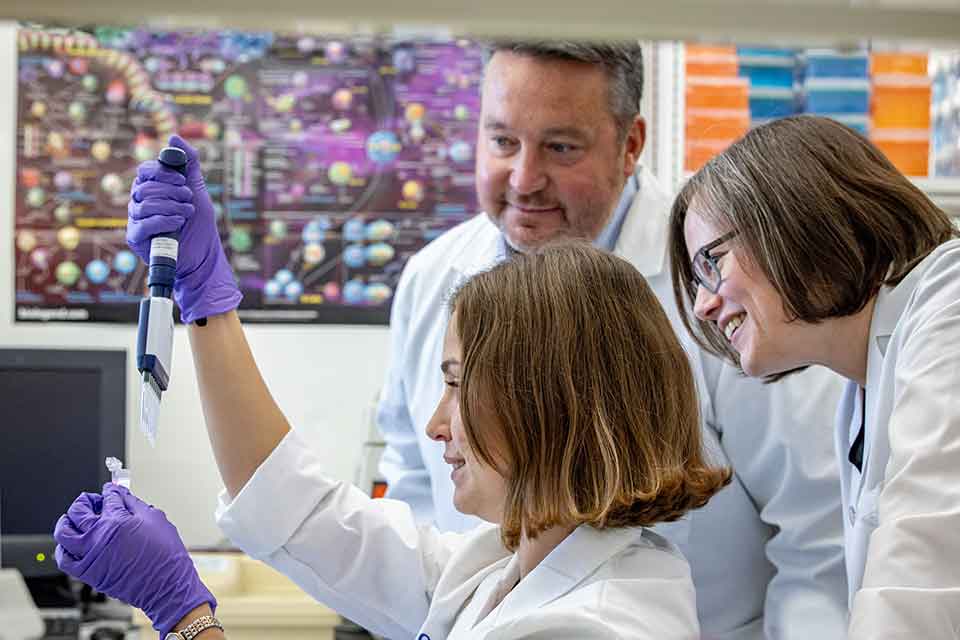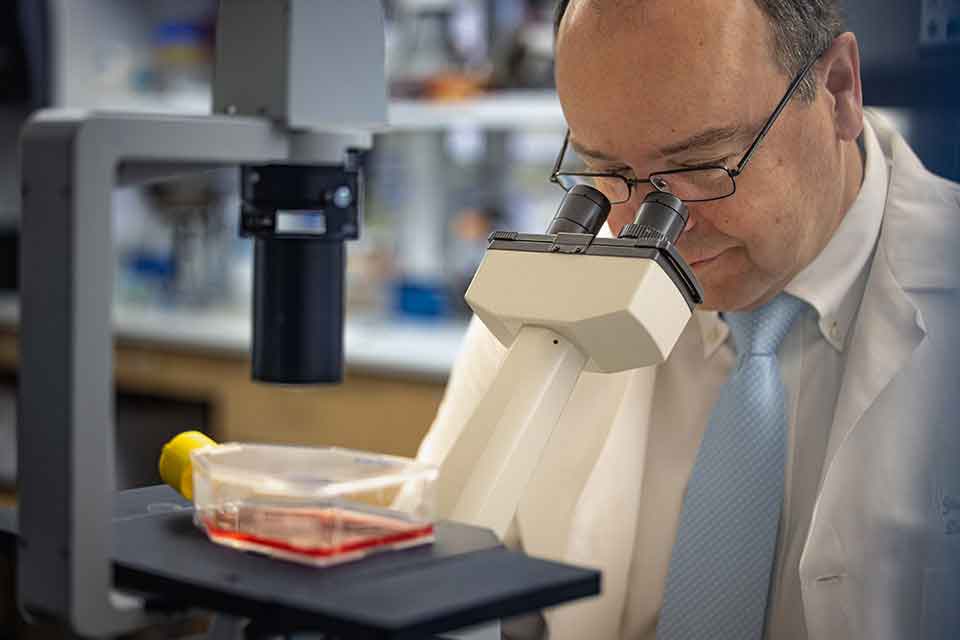New Treatments
Researchers at Saint Louis University strive to understand the mechanisms of disease so they can develop life-saving treatments to cure and prevent illness. From new treatments for liver disease to hepatitis B, the discoveries happening at SLU are transforming health and patient care around the world.
Saint Louis University School of Medicine
The Saint Louis University School of Medicine has a long tradition of excellence in teaching, research and patient care. Established in 1836, the school has the distinction of awarding the first medical degree west of the Mississippi River.
The Edward A. Doisy Department of Biochemistry and Molecular Biology marked its 100th anniversary in 2024. The department is named for its founder, who received the Nobel Prize in physiology or medicine in 1943 for the discovery of vitamin K.
The SLU School of Medicine is a leader in a number of interdisciplinary research fields. The following is a sample of the areas where SLU researchers are making breakthroughs.
Vaccine Research
The SLU Center for Vaccine Development brings together experts to develop and evaluate new vaccines and other therapeutics.
Home to one of only 10 federally funded Vaccine and Treatment Evaluation Units (VTEUs) in the country, the SLU Center for Vaccine Development is on the front line of the fight against infectious disease. This multidisciplinary center conducts basic, translational and clinical research on new vaccines and biologics to address diseases such as influenza, tuberculosis, COVID-19 and more. The center routinely works with hundreds of community members from the St. Louis region who volunteer to participate in various clinical trials.
In 2025, researchers conducted clinical trials to test the safety and effectiveness of vaccines for yellow fever and West Nile virus, as well as a human challenge study to study healthy adults’ pre-existing immunity to the flu.
Health Data
The Advanced HEAlth Data (AHEAD) Institute is a comprehensive center for data-driven innovation and research aimed at improving the health of individuals and populations. The institute brings together researchers from various fields and disciplines to help improve patient and population health, advance the quality of health care, and decrease health care costs.
The Advanced HEAlth Data (AHEAD) Research Institute conducts data-driven research to improve patient and population health, advance health care quality and decrease health care costs. The institute houses several large databases and assists SLU researchers in identifying, obtaining and maintaining data to meet their research needs.
Sepsis Research
The lab of David Ford, Ph.D., pioneered the field of chlorinated lipids, which are made in the body under conditions where there is inflammation. SLU researchers found that elevated levels of chlorinated lipids are linked to sepsis, lung injury and death. Ford’s lab performs mechanistic studies to identify new therapeutic targets to diagnose and treat sepsis earlier, saving lives and avoiding serious side effects.
Drug Discovery
SLU-IDBI brings together experts from a variety of disciplines to share expertise, stimulate ideas and foster collaboration. Five researchers from SLU-IDBI discuss the initiative, as well as their own research and its impact on quality of care around the world.
The Institute for Drug and Biotherapeutic Innovation (IDBI) is a multidisciplinary association of researchers with a shared interest in drug and biotherapeutic discovery and development to address unmet patient needs. IDBI is one of the University’s largest institutes, with more than 100 highly accomplished and nationally renowned members. Collectively, these experts have launched several startups and companies, obtained numerous patents, and secured more than $37 million in drug-discovery grant funding. Current research features the discovery and development of therapies for diseases including cancer; chronic pain; central nervous system disorders; liver disease; infectious diseases such as hepatitis B, tuberculosis, and fungal infections; genetic disorders including muscular dystrophy and lysosomal storage disease; and neglected diseases.
John Tavis, Ph.D., is the director of IDBI. In 2025, Tavis and his colleagues made a major breakthrough in their study of hepatitis B, reporting that a specific class of drugs, RNA interference (RNAi) therapeutics, could be leveraged to develop a cure for the disease.
Liver Research
The SLU Liver Center brings together doctors and research scientists from across the University to study liver disease through basic and clinical research and apply new technologies to improve patient care.
Jeffrey Teckman, M.D., has dedicated 30 years of his life to researching alpha-1 antitrypsin deficiency (AATD), a liver disease that affects one in every 3,500 Americans. In 2022, Teckman’s team at SLU, along with colleagues at Arrowhead Pharmaceuticals and Takeda Pharmaceuticals, discovered the first possible treatment for adults with AATD, which previously could only be treated with a liver transplant. In 2024, the team identified biomarkers in high-risk infants with AATD, allowing doctors to predict which children will need lifesaving intervention.
Brent Neuschwander-Tetri, M.D., studies steatotic (fatty) liver disease, which killed more than 38,000 Americans between 1999 and 2022. Neuschwander-Tetri has been funded by the National Institutes of Health since 2002 to participate in the Nonalcoholic Steatohepatitis Clinical Research Network, which has allowed him and his colleagues to shed new light on the genetic underpinnings of the condition and demonstrate the progression of liver disease in a large cohort.
Neuroscience
The Institute for Translational Neuroscience advances neuroscience research, education, clinical care and outreach activities across Saint Louis University and the broader St. Louis community. The center will become a pioneering leader in advancing SLU researchers' discoveries in the field of neuroscience that will ultimately have a major impact on patient care and in society.
The Institute for Translational Neuroscience (ITN), led by Daniela Salvemini, Ph.D., consists of more than 100 members from six colleges and 23 departments across the University. ITN researchers work to advance understanding of the nervous system and improve patients’ quality of life. Projects include: understanding the mechanisms of chronic pain and developing safer, nonopioid pain medication; identifying biomarkers that may precede cognitive decline or various psychological conditions; and improving the psychosocial health of trauma survivors and those living with substance use disorders and chronic health conditions.
Kidney Research
Krista Lentine, M.D., Ph.D., makes kidney transplantation more accessible while working to ensure the best long-term outcomes for transplant recipients and living organ donors. Kidney disease affects Black communities at disproportionately higher rates, and Lentine’s work was inspired by the needs of communities in St. Louis. In 2025, Lentine received the St. Louis Metropolitan Medicine Society Award of Merit for Outstanding Contributions to Scientific Medicine.



















